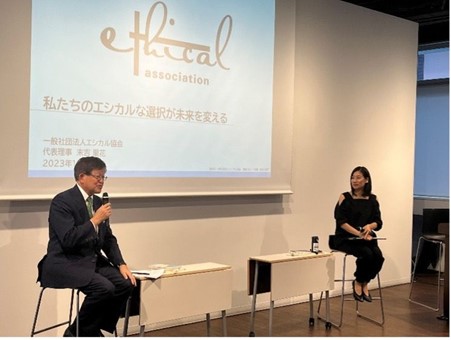2024年1月18日
Why former mystery hunter Rika Sueyoshi became aware of "ethics"
Hidemitsu Sasatani | Official ColumnistProfessor Chiba University of Commerce, Professor of Research Center for Sustainability
*Reprinted from an article on Forbes Japan Web
Forbes Japan Web

Rika Sueyoshi, Representative Director of the Ethical Association
Recently, the word "ethical" has been appearing more and more often.
The word "ethical" originated from the British term "ethical consumer" and refers to a way of thinking and behavior that takes into consideration people, the global environment (including all living things, including animals), society, and the local community. Following food and travel, it has now been adopted in the fashion industry.
The first person to set up an organization in Japan to spread ethical thinking was Rika Sueyoshi, the representative Director of the Ethical Association, a general incorporated association. When the association was founded in 2015, there were no other organizations with the word "ethical" in their name, making the association a pioneer in the field of ethics in Japan.
This time, we will unravel the essence of ethics through a lecture by Sueyoshi held on October 6th at the SDGs Research Institute, a corporate consortium where I serve as Head, and the contents of a conversation between the two.

Ethical "Evangelists"
Mr. Sueyoshi first became interested in ethics after appearing as a mystery hunter on the TV program "Hitachi Sekai Fushigi Hakken!" (TBS). When he summited Mount Kilimanjaro in 2004, he witnessed a shocking sight.
A glacier has remained on the summit of Mount Kilimanjaro since ancient times. However, due to global warming in recent years, about 90% of its original size has melted, affecting the lives of the people living at the foot of the mountain who rely on the meltwater.
Seeing this situation, he decided he wanted to start an activity to inform people about the various problems occurring around the world and to think of solutions together, and became an ethical evangelist.
Sueyoshi explained the general definition of ethical as "something that many people believe to be right, even if there is no legal requirement. It is a social norm that originally arises from the conscience that humans possess."
"We see ethics as a kind of philosophy, and we believe that ethics x SDGs = improved sustainability. Only by aiming to achieve the SDGs while having an ethical philosophy can we improve sustainability."
Japanese words and ethics
According to Sueyoshi, there are many words in Japan that are related to ethics.
Mutual support
Compassion
too good to waste
Knowing what is enough (having little and being content)
The sun is watching
Win-win-win
etc.
Rather than simply sending out foreign words, you need to always think about and explain what expressions are easy for Japanese people to understand, otherwise your explanations will be superficial.
In fact, the Consumer Affairs Agency once conducted a nationwide survey* called "Request for Japanese expressions that convey the meaning of 'ethical consumption'" through the "Ethical Consumption" Research Group. Ethical is defined in the government's Basic Consumer Plan as "consumption behavior that takes people, society, and the environment into consideration, including regional revitalization and employment," but the agency requested responses because this definition is difficult to achieve.
The survey results are interesting. "Thoughtful consumption" and "connected consumption" were mentioned relatively frequently, and various keywords were mentioned, such as "future," "kindness," "society," "connection," and "heart."
In response to this, it was concluded that since it would be difficult to replace it with a single name, it would be desirable to use appropriate words depending on the theme, target generation, etc.
(Text by Hidemitsu Sasatani)
* Summary of the "Ethical Consumption" Research Study Group: Your Consumption Will Change the Future of the World ("Ethical Consumption" Research Study Group)